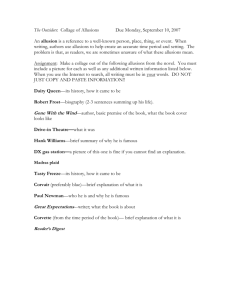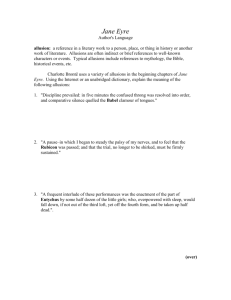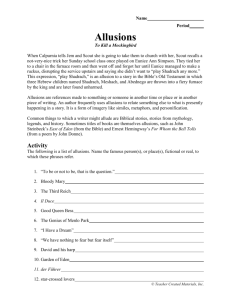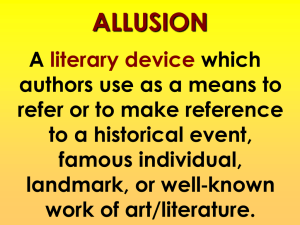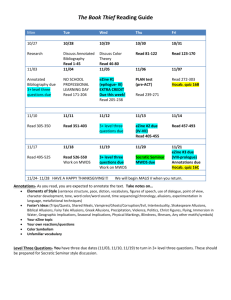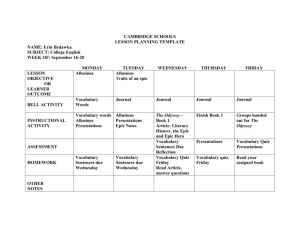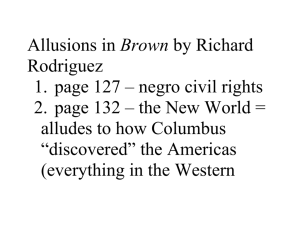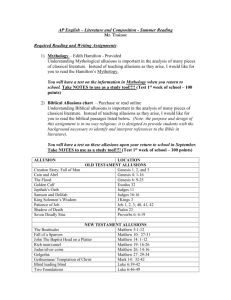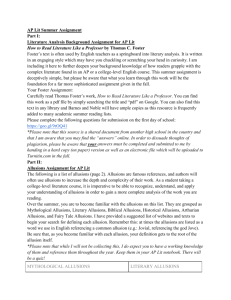Great Gatsby: Historical and Cultural Allusions
advertisement
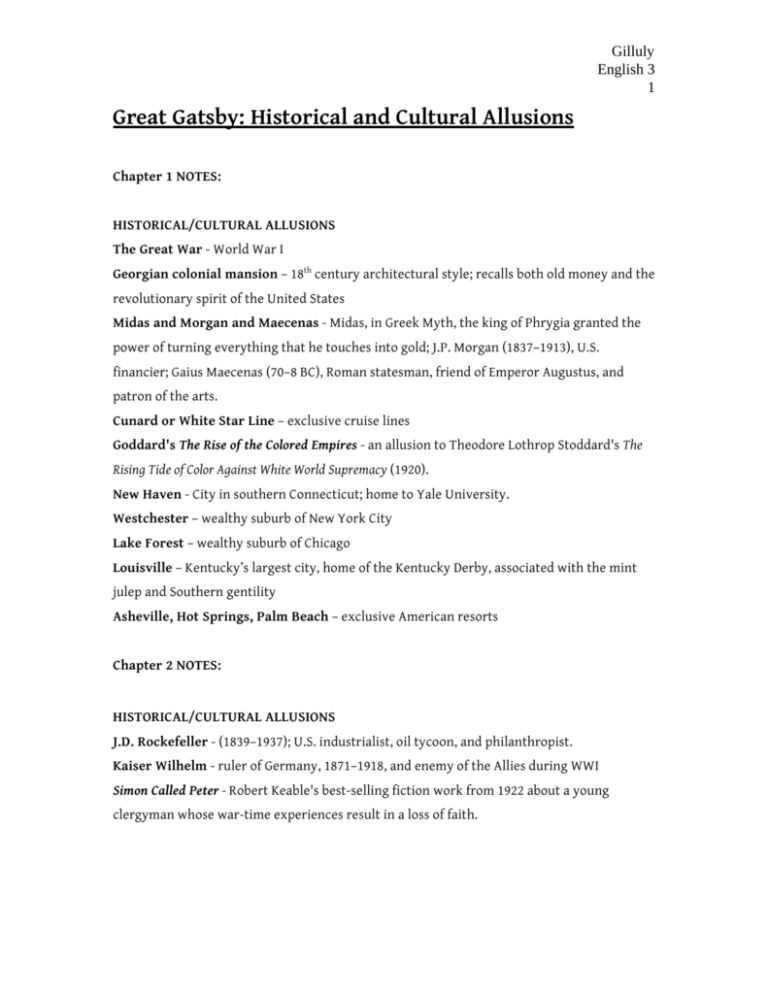
Gilluly English 3 1 Great Gatsby: Historical and Cultural Allusions Chapter 1 NOTES: HISTORICAL/CULTURAL ALLUSIONS The Great War - World War I th Georgian colonial mansion – 18 century architectural style; recalls both old money and the revolutionary spirit of the United States Midas and Morgan and Maecenas - Midas, in Greek Myth, the king of Phrygia granted the power of turning everything that he touches into gold; J.P. Morgan (1837–1913), U.S. financier; Gaius Maecenas (70–8 BC), Roman statesman, friend of Emperor Augustus, and patron of the arts. Cunard or White Star Line – exclusive cruise lines Goddard's The Rise of the Colored Empires - a n allusion to Theodore Lothrop Stoddard's The Rising Tide of Color Against White World Supremacy ( 1920). New Haven - City in southern Connecticut; home to Yale University. Westchester – wealthy suburb of New York City Lake Forest – wealthy suburb of Chicago Louisville – Kentucky’s largest city, home of the Kentucky Derby, associated with the mint julep and Southern gentility Asheville, Hot Springs, Palm Beach – exclusive American resorts Chapter 2 NOTES: HISTORICAL/CULTURAL ALLUSIONS J.D. Rockefeller - (1839–1937); U.S. industrialist, oil tycoon, and philanthropist. Kaiser Wilhelm - ruler of Germany, 1871–1918, and enemy of the Allies during WWI Simon Called Peter - R obert Keable's best-selling fiction work from 1922 about a young clergyman whose war-time experiences result in a loss of faith. Gilluly English 3 2 Queens/the valley of ashes – the swamp at Flushing Meadows, used as a disposal site for ashes from domestic heating during the 1920s; now home of the Billie Jean King Tennis Center anf the U.S. Open kike – a vulgar term for a Jew, shows hostility and contempt. HISTORICAL/CULTURAL ALLUSIONS Chapter 3 NOTES: Belasco - David Belasco (1853-1931); American theatrical producer, known for the realism of his sets. Stoddard lectures - travel series of books prodigality – think “prodigal son;” suggests wastefulness or extreme lavishness. The Follies - popular revue started by Florenz Ziegfeld in 1907. Gilda Gray – Polish immigrant, changed her name from Marianne Michalski, became highly paid star of the 1922 Ziegfeld Follies coupe - a closed, two-door automobile with a body smaller than that of a sedan. Yale Club – social club in New York City for Yale alum. Chapter 4 NOTES: HISTORICAL/CULTURAL ALLUSIONS Argonne Forest – in 1918, American troops fought in this region of northeast France, near the Belgian border. 1919 World Series – players from the Chicago White Sox accepted a bribe to lose a game, allowing the Cincinnati Reds to win the World Series. Bootlegger – a manufacturer & distributor of alcohol, during Prohibition Von Hindenburg – (1847-1934) soldier and second president of Germany Little Montnegro – small kingdom which was annexed by Yugoslavia in 1918 Blackwells Island – small island which lies in the East River beneath the Queensboro Bridge rd “old Metropole” – hotel at Broadway and 43 in Manhattan Sauterne - a sweet white wine served with dessert. Rosy Rosenthal – Herman Rosenthal, gangster, notorious for his role in political and police corruption, murdered by members of police department. Gilluly English 3 3 Camp Taylor – military base near Louisville, Kentucky. Chapter 5 NOTES: HISTORICAL/CULTURAL ALLUSIONS “the secret of Castle Rackrent”- C astle Rackrent is a novel, published in 1800, which traces the downfall of a family of Irish landowners who live beyond their means, written by Maria Edgeworth “like Kant at his church steeple” – German philosopher Immanuel Kant (1724 – 1804) was often found staring at the town’s steeple to help him organize his thoughts. “the Merton College Library” – library at Oxford University “Adam study” – in the style fo British neoclassical architect Robert Adam (1728-92) chartreuse – a green liquor Dan Cody – allusion to Buffalo Bill Cody, frontiersman and showman, who made money with popular Wild West shows “The Love Nest” – popular song of the 1920s Chapter 6 NOTES: HISTORICAL/CULTURAL ALLUSIONS Madame de Maintenon - (1635–1719); second wife of Louis XIV of France, often depicted as ambitious, greedy, evil, and narrow-minded. “underground pipeline to Canada” – a pipeline that was used to transport alcohol into the United States during Prohibition. Tuolomee – a gold-mining area of northern California Platonic conception – Greek philosopher Plato (427-348 BCE) argued that the material world was illusory and true reality existed in an ideal realm beyond human senses. “he must be about His Father’s Business” – ironic reference to words of Jesus, in Luke 2:49 Chapter 7 NOTES HISTORICAL/CULTURAL ALLUSIONS Gilluly English 3 4 Trimalchio – wealthy & extravagant character in Petronius' Satyricon, a satire on Roman life in the first century A.D. blessed isles – in classical mythology, where eternal peace can be found mint julep – classic drink of the American South, made with bourbon, sugar, and mint. Chapter 8 NOTES: HISTORICAL/CULTURAL ALLUSIONS Beale Street Blues – jazz song written in1917 Hempstead…South Hampton – Long Island shore towns. Chapter 9 NOTES HISTORICAL/CULTURAL ALLUSIONS pasquinade - a satirical piece of writing that holds its object up to ridicule, formerly one posted in a public place; lampoon. James J. Hill - (1838–1916) wealthy financier, built of the Great Northern Railway, peer of J.P. Morgan, rose from humble origins. Hopalong Cassidy - cowboy hero of western books by Clarence E. Milford El Greco - (about 1541–1614); Spanish painter of religious scenes, which were usually elongated and distorted. Gatsby’s boyhood schedule – refers to Benjamin Franklin’s schedule in his Autobiography, which exemplifies the American ideal of advancement through discipline and hard work.
